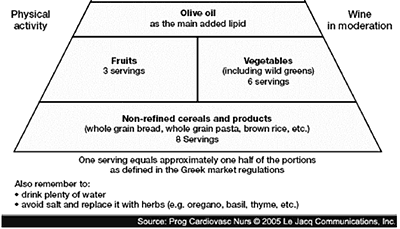Mediterranean Diet Gains Momentum
Science is Strong for the Med Style of Eating
A flood of studies over the past year have increased support for the Mediterranean (Med) style of eating. Some of the most recent findings include:
- A study published in the British Medical Journal reported that a Med style diet can lower the risk of developing diabetes by 83% in those with high adherence to the diet, and by 40% with moderate adherence;
- A study of nearly 400,000 people, published in the Archives of Internal Medicine, found that sticking to the Med diet reduced the risk of death from cardiovascular disease and cancer by 22% and 17% in men, and by 19% and 12% in women;
- Research reported in the medical journal of the American Academy of Neurology, found that adhering to the Med diet could extend the life of people suffering from Alzheimer's;
- A Med-style eating plan was shown to cut the risk of dying from cardiovascular disease by 30% in a study published in the American Journal of Clinical Nutrition.
In Head-to-Head Test, Med Diet Promotes Weight Loss and is Best for Diabetics
Results from a 2-year trial comparing weight loss with a low-carb, Med-style or low-fat diet, made the news last month. In this tightly controlled experiment, 322 overweight people were assigned to 1 of 3 types of diet: a low-fat diet based on American Heart Association guidelines, a low-carb diet based on the Atkins plan, and a Med style diet.
The biggest weight loss happened in the first 5 months, with people in all 3 groups regaining some of the lost weight as time went on. At the end of 2 years, the low-fat dieters lost about 6 pounds while the Med and low-carb groups both lost about 10 pounds.
While the weight loss was modest, it resulted in improved health markers, and there were subtle differences in the 3 diets studied. Men seemed to do better on the low-carb diet, losing 11 pounds versus about 9 on the Med diet. Women fared best on the Med diet, losing about 14 pounds compared with about 5 pounds on the low-carb eating plan. For all dieters, the ratio of good to bad cholesterol improved. But among the 36 diabetic participants, the Med diet had the most favorable effect on glycemic control. Diabetics had better blood glucose and insulin levels.
What is the Med Style Diet?
The med diet is rich in cereals, wine, fruits, vegetables, nuts, beans, whole grains, fish and olive oil - foods which provide carotenoids, vitamins A, C and E, polyphenols, essential minerals, and the omega-3 fats.
Common foods include pasta, bread (whole grain is best), rice and couscous, olives, avocados, grapes, eggplant, tomatoes, peppers, nuts and beans, cheese and yogurt. Moderate consumption of fish and poultry is encouraged, while red meat is advised only a few times per month.
If you're not yet following the Med style of eating, the Mediterranean Pyramid, endorsed by the Harvard School of Public Health and the World Health Organization, can serve as a model to help you get started.


- Shai I, et al. Weight loss with a low-carbohydrate, Mediterranean, or low-fat diet. New England Journal of Medicine 359:229-41, 2008.















